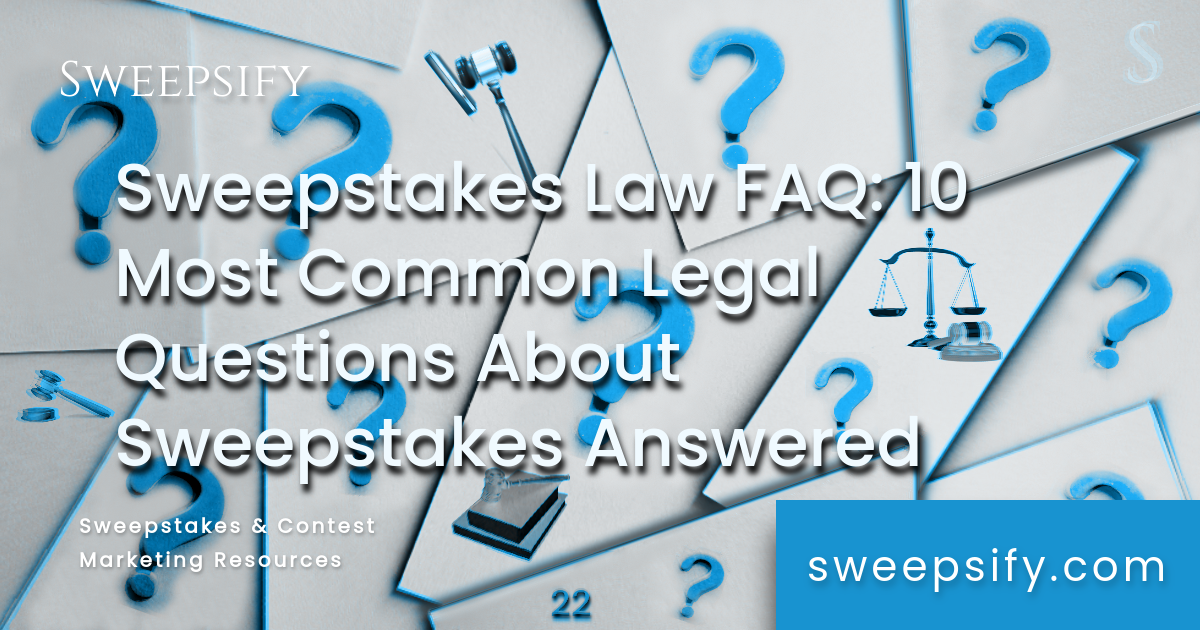Here is a list of our current affiliate partners and how we earn money
What sweepstakes law questions do brands need to answers to? Common sweepstakes legal questions as they are asked often to sweepstakes administrators, need quick answers.
If you have questions about specific aspects of the design of your sweepstakes promotion, the topics below can provide you with some general information. After reviewing this information, if you still have questions you should contact a sweepstakes lawyer or sweepstakes company for further help.
Article Contents
IN THIS ARTICLE:
- What are questions to ask sweepstakes lawyers?
- What are the most common legal questions about sweepstakes?
- What are sweepstakes law compliance questions?
via GIPHY
General Sweepstakes Legal Questions
Get the answers to sweepstakes law questions and the most common legal questions about sweepstakes that sweepstakes administrators can typically answer for you. If you want more specific advice, especially regarding NFT sweepstakes, crypto sweepstakes or any sweepstakes involving social media platforms, a specialist in that area can help. Brands should look for a marketing law attorney or gaming law attorney to provide further assistance.
Sweepstakes Law FAQ Questions
- How do I know if I need a sweepstakes Official Rules review?
- How do I ensure legal compliance for a sweepstakes?
- How do sweepstakes administrators compare with sweepstakes attorneys?
- Why seek out sweepstakes law help instead of the in-house legal department?
- Why should brands obtain prize indemnity insurance?
- What are the legal requirements for brands that want permission to use sweepstakes user-generated content (UGC)?
Many sweepstakes legal concerns are fairly complex and may involve multiple areas of the law. The following is a list of common sweepstakes legal concerns.
Sweepstakes Legal Concerns:
These are the areas of sweepstakes law, gaming law, marketing law, and advertising law that all impact brands that run sweepstakes:
- Data collection and privacy
- Intellectual property
- Misleading claims
- Ethical considerations
- Advertising regulations
- Mobile marketing laws
- Social media platform TOS
All sweepstakes must follow U.S. sweepstakes law. To learn what specific laws apply to your sweepstakes, you need a sweepstakes legal review.
via GIPHY
Prize Indemnity Insurance Protects Brands and Participants
Prize indemnity insurance is protection for your brand to ensure your sweepstakes prize is covered and the delivery of your prize is completed without risking unnecessary liability to either party, the brand or the sweepstakes winner(s). Indemnity clauses are present in sweepstakes Official Rules, but prize indemnity insurance is something separate.
Free Advertisement Maker with Templates
Canva lets you create eye-catching advertisements with their free ad maker. Customize your sweepstakes, contest, or raffle ads with trending images, fonts, and high quality design assets.
ADVERTISEMENT
In the event that something goes wrong with the prize delivery, prize indemnity insurance protects brands from loss (including monetary compensation). On the other hand, it also ensures that participants understand the responsibility that comes along with the acceptance of the prize.
Sweepstakes participants should be made aware and to sign in written agreements regarding the Terms and Conditions associated with the receipt of the prize. Participants must also assume liability after prize delivery, such as in the case of a car sweepstakes prize.
The specific Terms and Conditions regarding this aspect of your promotion need to be included in your sweepstakes Official Rules. Work with a prize fulfillment company for assistance in obtaining the proper written documentation from participants and advice on prize indemnity insurance policies.
Subscribe Now:
Brands Must Ensure Advertising Compliance in Sweepstakes Promotions
Sweepstakes advertising is the most common method used by businesses to promote their sweepstakes and contests. Ads can impact a large number of people digitally which is why they are subject to strict regulations. When advertising your sweepstakes, you should always make sure to have your creatives reviewed by a sweepstakes lawyer to ensure that you follow all U.S. advertising laws.
Ethical Considerations of Running a Sweepstakes Brands Must Consider
Sweepstakes also come along with ethical considerations that oftentimes fall in a grey area for brands. You may run into these types of legal questions when it comes to choosing your sweepstakes prize, the customer experience, UGC created by your participants, and any data or privacy compliance concerns that may arise from the use of sweepstakes management tools and platforms.
Sweepstakes Law Compliance Is Required for Your Official Rules
All sweepstakes Official Rules must comply with all applicable federal, state, and local laws. The exact regulations that apply to your sweepstakes campaign will depend on the specific design of your promotion.
All sweepstakes promotions are unique. As a result, there is no one-size-fits-all solution when it comes to drafting sweepstakes rules. Furthermore, if you seek prize indemnity insurance for your promo, you will be required to submit the Official Rules for your sweepstakes in order to obtain a policy.
Sweepstakes Companies Do Legal Compliance
Working with a sweepstakes company can help you to resolve most of these concerns as sweepstakes management platforms are designed to standardize the delivery of the promotion. On the legal compliance side, this includes drafting Official Rules to ensure that your promotion follows sweepstakes laws.
10 Most Common Sweepstakes Legal Questions
1. What Sweepstakes Legal Concerns Are There for Social Media?
The social media networks that you can use to promote your sweepstakes are mostly dependent on your preference. However, if your brand is in a highly-regulated industry, your options may be more limited.
2. Who Can Answer Legal Questions About Sweepstakes?
A sweepstakes administrator works for a sweepstakes company with access to legal counsel as needed. If you work with a sweepstakes company, they will be able to ensure that your sweepstakes is legally compliant. You are also free to hire your own sweepstakes attorney for assistance with reviewing your promotion.
To learn more about sweepstakes law FAQ, review the following articles:
Sweepstakes Laws Compliance: Is Hiring a Sweepstakes Administrator Essential for ROI?
Legal Documents You Need to Run a Sweepstakes
How Protect Your Company From Legal Risks When Running a Sweepstakes
3. Can You Use a Sweepstakes Rules Template?
No, do not reuse sweepstakes rules that you find online. They may seem to address legal questions that you have about sweepstakes but they will not ensure that your sweepstakes is legal.
4. How Do Sweepstakes Laws Apply to Influencer Advertising for Sweepstakes Promotion?
Many brands engage influencers and brand ambassadors for the promotion of their sweepstakes through social media channels. As a result, these endorsers are required to comply with the guidelines of the Federal Trade Commission (FTC). The endorsers are required to disclose their connection to your promotion. Furthermore, if there is monetary compensation involved, then a formal agreement is highly advisable as violations of FTC regulations can open up companies to heavy fines.
5. How Do Mobile Marketing Laws Apply to Sweepstakes Promos?
Text to win and SMS sweepstakes must follow all mobile marketing regulations, including the Telephone Consumer Protection Act (TCPA). Brands must also also obtain express written consent in order to contact anyone via text message for marketing purposes.
6. What Are the Sweepstakes Eligibility Restrictions Required by Law?
Certain regulated industries are disallowed from running sweepstakes promotions in some states. Sweepstakes laws further restrict sweepstakes from being advertised unless brands obtain the proper authorizations from regulators. Make sure that your Official Rules explain exactly where and how your promotion is voided if the participant is ineligible to participate according to the law as a result of their age, location of residence or other requirement.
7. How Do I Know If My Promotion Needs to Be Registered and Bonded?
These days, many brands are running promos that allow participants from multiple states. Check that your promo doesn’t need to be registered and bonded with state regulators with a sweepstakes lawyer.
8. What Sweepstakes Laws Apply to Brands That Use Sweepstakes UGC for Marketing?
Advertising, data collection, and privacy are some of the concerns that arise when it comes to how the law applies to sweepstakes UGC. Brands should seek out the advice of a social media attorney when it comes to determining what permissions are required from your participants. A sweepstakes administrator will help you obtain and organize the necessary documentation required from sweepstakes winners and participants.
9. Does Sweepstakes Law Require You to Obtain Prize Indemnity Insurance?
Prize indemnity insurance is an optional decision for most brands. However, it is highly recommended given the valuable nature of some sweepstakes prizes or the potential for liability concerns to arise as a result of prizing delivery. A prize fulfillment service can provide you with some tips on what’s best for your promotion.
10. Do Sweepstakes Winners Have to be Drawn Randomly?
Yes, sweepstakes law requires that the sweepstakes Sponsor(s) conduct random drawings for winners. Random drawing followed by winner announcement (and publication of a list of winners, in some cases) is required for all U.S. legal sweepstakes promotions.
Consideration is not permitted for legal sweepstakes in the United States. If you are unsure if your promotion includes an element of consideration that may result in your promotion being considered by regulators as an illegal lottery, you should have an attorney review your sweepstakes Official Rules before your promotion goes live.
Request a Sweepstakes Official Rules Review
You should work with professional sweepstakes administration services to obtain a sweepstakes official rules review. This sweepstakes rules review will help to ensure that your promotion follows all of the requirements for compliance with federal, state, and local laws.
Looking for a sweepstakes company to help you with your next promotion? Sweepsify helps you find top sweepstakes companies in seconds. Create your free Premium account now to get started.






